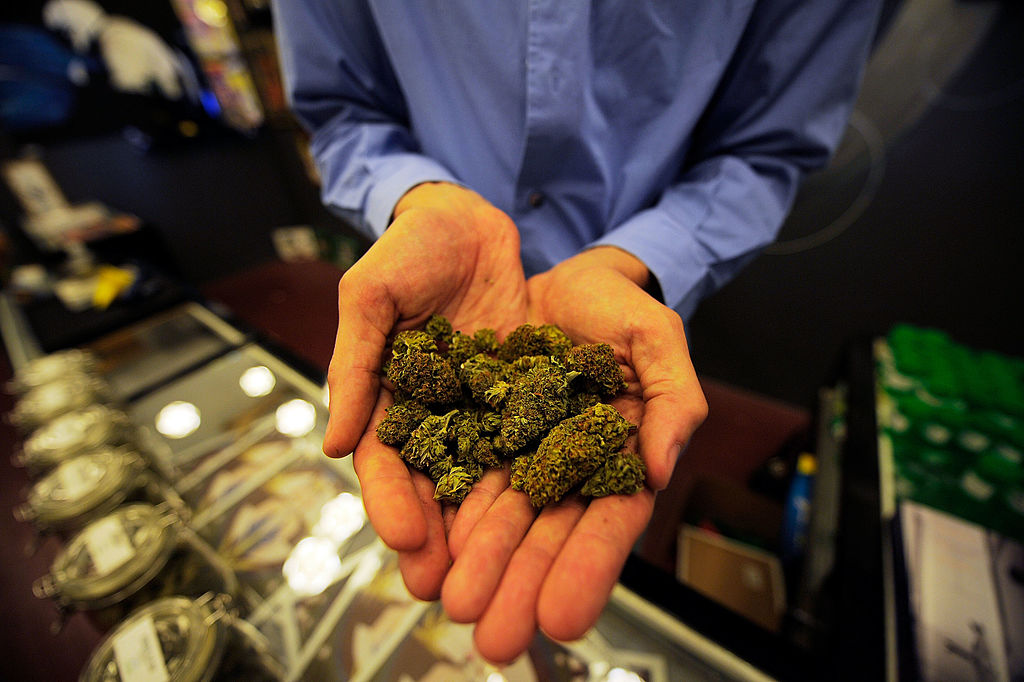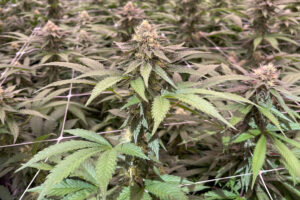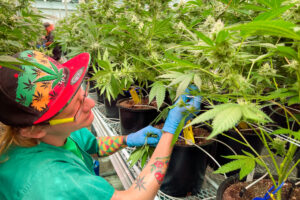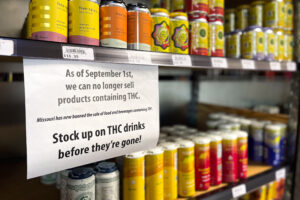5:55
News Story
Richard Batenburg Jr. feels deceived and cheated.
His cannabis brand, Colorado-based The Clear, has been partnering with a licensed Missouri manufacturer to produce pre-rolled joints. Some were infused with a THC concentrate, or distillate, purchased from a Robertsville-based company called Delta Extraction.
When the state issued a recall last month of all products made with the same distillate — a total of 62,000 products — Batenburg’s company was stuck with 90,000 joints taking up space in a Missouri warehouse that he still can’t do anything with.
But it’s not just the recall that got under his skin.
As Delta Extraction was fighting off their license suspension and the recall by state regulators, the company revealed it had been importing concentrated THC oil made from industrial hemp — which is about four times cheaper to make than marijuana THC concentrate in Missouri.
Batenburg had no idea his team was likely buying what he calls a “synthetic” THC — or THC that had been converted from hemp’s CBD using a heavy chemical process — mixed with a small amount of marijuana, while still paying marijuana prices.
Did recalled Missouri cannabis products pose health risks? Regulators aren’t sure
Even more infuriating than overpaying for hemp, Batenburg said, is that he was unknowingly deceiving his own customers who thought they were getting a pure marijuana product.
“They were duping all these compliant operators,” he said. “What they’re doing — from a commerce perspective — it’s criminal. They were probably more surprised than anybody that they weren’t getting caught.”
Delta declined comment for this story, citing ongoing litigation.
But Delta has fiercely denied any wrongdoing, both in the company’s lawsuit to stop the recall and the administrative hearing to appeal their license suspension.
The only reason Batenburg learned about Delta’s hemp process is because the recall sparked litigation, which in turn resulted in dozens of court filings that include emails, testing results, material purchases and a transcript with hours of testimony from the company’s leaders.
That’s also how John Lopez, CEO of Old Route 66 Wellness whose brand Bison Infused was also on the recall list, learned about Delta’s use of hemp. His business only bought a small amount of the distillate in April, when there was a dip in supply after Missouri’s recreational marijuana sales began.
And that decision has cost him $800,000 in products.
While Delta manufactured and sold the distillate, Lopez puts most of the blame on the brand that contracted with Delta to follow a recipe and make the product — Oklahoma-based Conte Enterprise.
“We would have never bought it” had his team known it was chemically converted THC from hemp, Lopez said.
A spokeswoman for Conte said the company, “stands by the safety and quality of its product. However, it does not comment on pending litigation.”
Rachel Herndon, COO of Delta, also defended the product during an Aug. 14 commission hearing.
“We bolstered this industry, we supported this industry, and we cut costs low for consumers,” she said. “And we did it all while being in constant communication with the state and believing that our processes were allowed and appropriate. All of our product was tested. And we have no consumer complaints.”
Batenburg works with the manufacturer Dark Horse Medicinals to produce his brand. That company is now suing Conte and Delta Extraction to recoup its losses after purchasing nearly $325,000 of distillate in May that went into making about $1 million worth of products.
A Missouri judge has already dismissed Delta’s lawsuit against the state to stop the recall, and a commissioner handling the company’s appeal of its license suspension recently denied its request for a stay. A final decision in the appeal is still pending, and the commission will hold a hearing on Sept. 29.
As the Delta case winds through the legal system, it offers a rare glimpse into Missouri’s burgeoning cannabis industry, which has been shrouded in secrecy since voters approved medical marijuana in 2018.
And the ordeal also brings up a major question for Missouri consumers:
How often were they overpaying for what they thought was Missouri-grown marijuana but were actually getting hemp grown somewhere else?
What we now know

Delta Extraction is a licensed marijuana manufacturer that specializes in making distillate, a highly potent and pure form of THC oil used for things like vape pens and edibles.
On Aug. 2, the state regulating agency suspended Delta Extraction’s license after accusing the company of sourcing untested “marijuana or converted hemp from outside of a Missouri licensed cultivation facility.”
Delta is accused by state regulators of “inversion,” or bringing in illegal marijuana products from other states and adding it to their own products in order to keep their production numbers up. But the company argues it hasn’t violated the law because it was importing hemp, a federally legal substance.
“As a matter of law, industrial hemp is not marijuana,” according to an Aug. 25 brief Delta’s attorneys filed with the Administrative Hearing Commission. “The Missouri Constitution and the department’s own regulations define marijuana to specifically exclude industrial hemp.”
While this type of inversion is illegal in Missouri, it is allowed in Conte’s home state of Oklahoma and others, including Arizona and Wyoming, said attorney Clark Wu, who specializes in hemp and cannabis law and is a partner at the Arizona-based law firm Bianchi & Brandt.
“Inversion is not illegal everywhere,” Wu said. “In some states … you can do an inversion. There’s a legal process for introducing hemp-derived products into the cannabis system.”
The state issued an administrative hold on the 62,000 products days after the company’s suspension and a full product recall on Aug. 14.
According to documents filed in both the lawsuit and appeal, Delta has been selling Conte’s THC distillate for over a year. The majority of the distillate is likely hemp-derived THC-A — a compound of the cannabis plant that isn’t intoxicating until heated — combined with a small amount of Missouri marijuana.
The company has sold 700 liters of this concoction since at least July 2022, said Jack Maritz, general manager and lab manager of Delta Extraction, in his Aug.14 testimony before the Administrative Hearing Commission.
And it’s sold to 135 Missouri marijuana license holders, with Delta making $20 million since it began offering a hemp-marijuana distillate in April 2022, company leaders said in their testimonies.
The 700 liters of oil has the potential to make “millions of packs of edibles,” Maritz said in his testimony.
In the state’s initial investigation, regulators found two examples where altogether, Delta Extraction used 9 grams of THC originating from Missouri marijuana, but produced 168,698 grams of distillate.
“Delta Extraction, practically speaking, is importing cannabinoids from other states, converting it to THC, and then selling it in the regulated market as if it is Missouri marijuana,” according to a Aug. 22 brief filed by the state in the company’s appeal before the Administrative Hearing Commission. “The distillate, at least in the two unrefuted examples set out above, contains virtually no Missouri cultivated marijuana at all.”
Hemp doesn’t naturally have a lot of potentially intoxicating cannabinoids like THC or THC-A. When the Farm Bill of 2018 took hemp off the federally controlled substance list, it unintentionally also gave the green light for people to legally make THC and THC-A from CBD, using various chemicals and heat.
Currently, chemically converted THC from hemp is completely unregulated on a federal and state level.
Batenburg said he has a personal aversion to the process used by Delta and would never have allowed it in his products had he known it was happening.
“I don’t think it’s the same if it’s been tortured to get to the same molecule,” he said.
Big profits
Delta is a “white labeling” marijuana manufacturer, Maritz said in his Aug. 14 testimony. This means that cannabis brands contract with the company to make their products using the exact recipes that their customers have come to expect.
These arrangements are common for out-of-state brands, such as Conte, that are not licensed to produce or sell marijuana in Missouri.
“We’ll fill up cartridges or make products for them and put their packaging on it,” Maritz said.
Delta has two brands under which it distributes products — Midwest Magic and Conte — the company said in its lawsuit against the state. Eighty percent of what Delta was producing was the Conte brand that included the hemp-derived THC, Maritz said in his testimony.
Conte said in a motion to intervene in Delta’s lawsuit that the companies have mutual agreements concerning “specific services and trademarks used in cannabis products” that began in February 2022.
Across the country, these are typical agreements necessary to “consummate a ‘white-labeling’ relationship,” Wu said.
How it often works, he said, is that the licensed marijuana manufacturer charges a fixed fee for each unit of product manufactured or produced under the agreement.
As a matter of law, industrial hemp is not marijuana. The Missouri Constitution and the department’s own regulations define marijuana to specifically exclude industrial hemp.
– Delta Extraction attorneys in a filing with the Administrative Hearing Commission
However, the state describes the relationship between Conte and Delta as “murky,” because Delta says it has 18 employees, but many of them are on Conte’s payroll.
Murky, Wu said, is a “fair statement.”
“There are signs of Conte operating as a brand under Delta’s business umbrella,” Wu said.
According to Maritz’s testimony and exhibits presented by the state, Delta had been buying THC-A oil since around July 2022.
From May 4 to July 26, Delta bought almost 1,700 liters of the hemp-derived THC-A product from Arvida Labs in Fort Lauderdale, according to exhibits in the case.
The documents don’t say how much Delta paid for it, and it’s unclear what the proportion of the Arvida oil, rather than marijuana, was in the distillate it sold in Missouri.
But according to Maritz’s testimony, it likely had a lot of hemp-derived THC in it.
Maritz discussed one instance where Delta took 2,900 grams of marijuana “bud flower material” that it bought from a Missouri cultivator and made a concentrate.
“Then we took 4 grams of that concentrate, and we added 38,000 grams, basically, to it,” he said, meaning the hemp-derived oil. “This was our process with Conte.”
Delta had 1,100 liters of the Conte-brand distillate in its warehouse the day the company’s license and operations were suspended on Aug. 2, and it was planning on selling it for $12,000 per liter, Maritz said in his testimony.
In May, the manufacturer producing Batenburg’s brand bought the distillate for about $16,000 per liter, according to the Dark Horse lawsuit filings. And industry experts say a liter of marijuana distillate at that time went for about $20,000.
However, according to a recent Arvida sales quote, a liter of THC-A oil costs much less — around $3,500 — and the price goes down as more is purchased.
Looking at these numbers, Batenburg said, “the amount of money they were making is obscene.”
Delta’s defense
Delta is arguing that it has been making these products since 2022 and was never told by state regulators that it couldn’t.
“And so that distillate has been distributed throughout the entire state of Missouri,” Maritz said. “We’ve never heard of a failed test or someone getting sick or anything like that. So since we got approval from the department to do this process, we’ve never had a problem. But now, apparently, we’re here.”
Delta’s argument largely hinges on the fact that it provided the state with “standard operating procedures” in July 2022, and the state didn’t say anything about the company’s process.
Tyler Williams is the CEO of ASI Food Safety and specializes in writing these cannabis standards. He reviewed the procedures that Delta submitted to the state. He said the state regulators wouldn’t have likely known what Delta was doing because standards are “unclear,” even to someone who works in writing them.
“Nowhere in the document does it say that hemp will be used to make THC-A or that it will be added to medical cannabis products,” he said.
He pointed to the state’s emergency rules filed on Jan. 20, where it says: “Manufactured product may not contain chemical modification, conversion, or synthetic derivation of cannabinoids to produce intoxicating cannabinoid isomers.”
Delta’s practice was against these rules, Williams contends.
“This is, in my opinion, blatant fraud and a risk to consumer health,” Williams said. According to their own standard operating procedures, Delta and Conte “are only testing hemp products for pesticides and it is not controlled the same as their medical cannabis products. Basically, they are increasing the THC of their products for economic gain and putting consumers at risk.”
Batenburg said he wasn’t impressed by Delta’s argument, either.
“That’s the defense of a guilty person trying to claim ignorance — or ‘The fact that you didn’t catch us means that we’re not guilty,’” Batenburg said. “It’s just bullsh–. This is a real black eye on the industry.”
In its appeal, Delta argues that the Missouri didn’t specifically ban this process until the state’s final rules went into effect on July 30 of this year.
But Carole Iles of the Administrative Hearing Commission said in an Aug. 29 order that the company will likely lose on that point. The only thing the cannabis regulating agency, the Missouri Department of Health and Senior Services, added to this line in the final rules was the clause “such as THC-A …”
“We agree with the department that language added to the permanent rule … did not change the requirement of the emergency rule that THC in marijuana products could only be derived from marijuana cultivated by a Missouri-licensed cultivation facility,” the order states.
‘No way to know’

Both Batenburg and Lopez said there was “no way” for companies to know that Delta wasn’t producing marijuana distillate unless the state caught it.
And this was not business-as-usual in the Missouri market, they said.
“Every manufacturer that’s on that list besides Conte and the two related to Conte are victims as well,” Lopez said, “because we went by all of the rules of the state, and we’re not protected by it.”
The companies that bought the Conte oil found it on the state’s tracking system, called Metrc. The state has paid the company running Metrc between $700,000 and $900,000 every year since 2020.
From the moment the plant starts to sprout, it gets a tag that goes into Metrc, and that plant’s yield is tracked until it finds its way into a vape pen or joint.
Company owners saw the distillate listed on Metrc, along with the “certificate of analysis” from the lab that showed it was safe for consumers.
Delta sold at least 700 liters of the Conte distillate, Maritz said in his testimony. A liter of 80% concentrated THC can make more than 70,000 individual “doses” at 10mg THC a piece, industry experts say. That’s almost 50 million doses.
So the likelihood that Missourians bought something they thought was pure marijuana but was really hemp-based this past spring is high.
Lopez said he knows that many licensed manufacturers and dispensaries, especially the small ones, won’t bounce back from their losses, but he doesn’t believe anything like this could happen again.
This all happened when recreational marijuana sales started, Lopez said, and when the state was making a “big push for new hires,” he said.
“It was one bad apple, and we did everything we could, and the state caught it like they should have,” he said. “I don’t think it could happen again. But I could be wrong.”
GET THE MORNING HEADLINES.
Our stories may be republished online or in print under Creative Commons license CC BY-NC-ND 4.0. We ask that you edit only for style or to shorten, provide proper attribution and link to our website. AP and Getty images may not be republished. Please see our republishing guidelines for use of any other photos and graphics.





